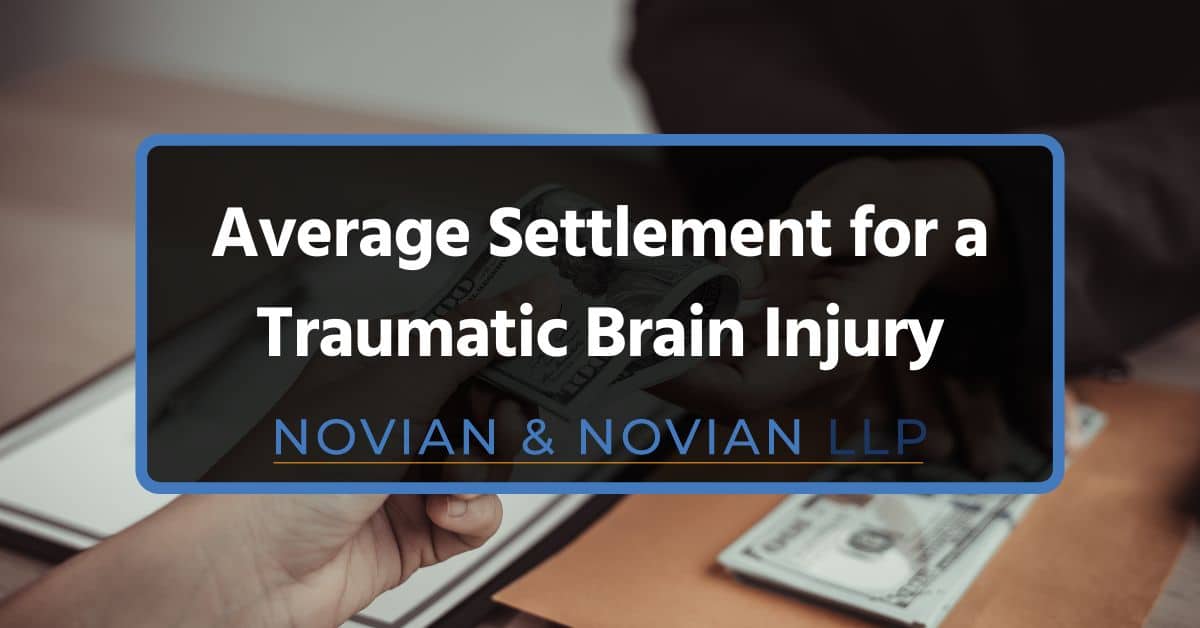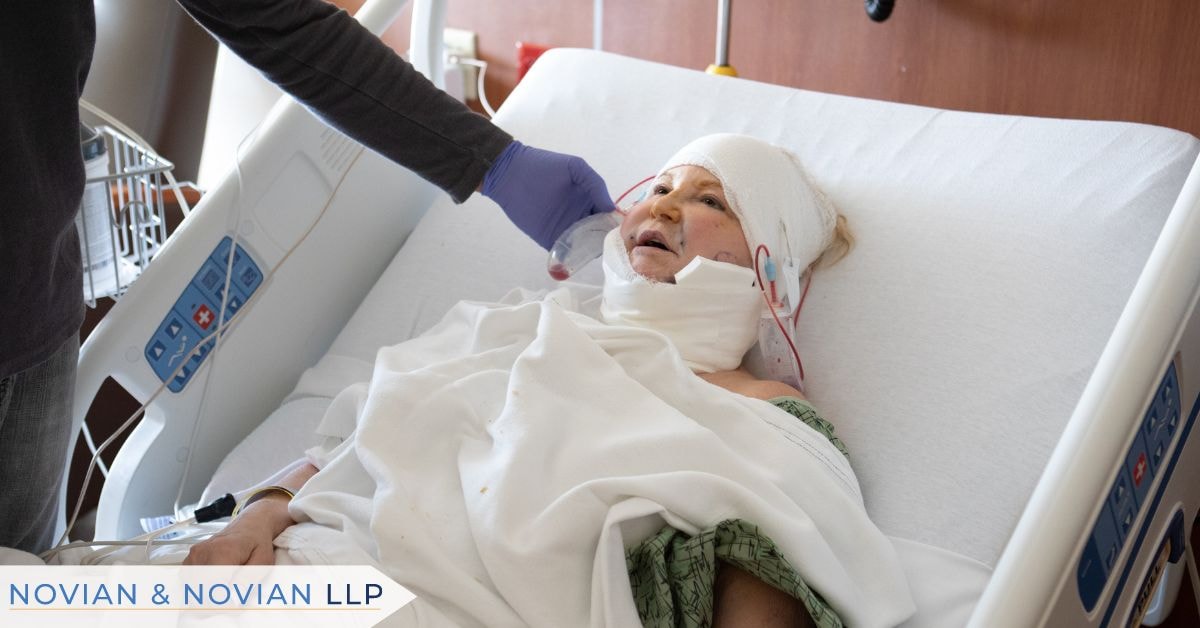A traumatic brain injury (TBI) is an injury that occurs when a sudden blow or jolt to the head disrupts the brain’s normal function. These injuries can range anywhere from mild concussions to severe, life-altering damage.
The average settlement for a TBI case in California can vary significantly, typically ranging from $100,000 to $5 million, depending on the severity of the injury and its long-term effects on the victim’s life. Factors influencing these amounts include the extent of medical care required, the victim’s ability to return to work, and the degree of negligence involved in the case.
At Novian & Novian, we have a team of expert catastrophic injury lawyers who have been in the industry for over 30 years and are ready to work with you to get the best settlement possible for your case. As such, if you or a loved one have suffered a traumatic brain injury, reach out to us today to schedule a free consultation.
This blog post will explain traumatic brain injuries (TBIs), highlight the average settlement amount for TBI cases in California, and discuss the factors that influence the eventual settlement outcome.
Table Of Contents
- What Are Traumatic Brain Injuries (TBIs)?
- What Is the Average Settlement for a Traumatic Brain Injury Case?
- Factors Affecting Traumatic Brain Injury Settlement Amounts
- What Is the Life Expectancy of Someone With a Traumatic Brain Injury?
- What Evidence Do You Need in a Traumatic Brain Injury Claim?
- How Long Does It Take to Reach a Settlement?
- Tips for Maximizing a TBI Settlement
- How Legal Representation Affects Settlement Value?
- Need a Traumatic Brain Injury Lawyer?
- FAQS
What Are Traumatic Brain Injuries (TBIs)?
A traumatic brain injury (TBI) is an injury that disrupts the brain’s normal function. It could be mild, moderate, or severe. It could be a mild concussion or even an injury that leads to paralysis.
Common causes of traumatic brain injuries in California include car accidents, sports injuries, and slip-and-fall accidents. Violence and blasts that are common in military settings are also causes of traumatic brain injuries, as they can lead to both direct and indirect brain injuries.
Mild traumatic brain injury, also referred to as a concussion, is an injury that usually results in temporary brain dysfunction. Symptoms may include headaches, dizziness, and confusion, which often resolve within weeks. However, even mild TBIs can lead to long-term issues if not properly treated.
Typically, moderate traumatic brain injuries are more severe than mild TBIs. Moderate TBIs may result in unconsciousness lasting from a few minutes to hours. These injuries often cause longer-lasting symptoms such as persistent headaches, memory problems, and behavioral changes.
Furthermore, severe TBIs can cause permanent damage and lead to disabilities that require lifelong care. Victims may experience loss of physical coordination, cognitive decline, and emotional instability. The impact on daily life is profound, affecting not only the individual but their family as well.
Why Is Compensation Important for TBI Victims?
Traumatic brain injuries can have a devastating impact on both the victim and their family. The physical, emotional, and financial toll is immense on TBI victims as they often face mounting medical bills, costly rehabilitation, and loss of income due to the inability to return to work.
Compensation for a TBI helps cover medical expenses (immediate and ongoing medical care, including surgeries, medication, and therapy) and lost wages (both the short-term loss of income due to time away from work and long-term earning potential if the injury leads to permanent disability). It also covers non-economic damages like compensation for pain and suffering, emotional distress, and loss of quality of life.
What Is the Average Settlement for a Traumatic Brain Injury Case?
TBI settlement amounts can vary depending on the severity of the injury, its impact on the victim’s life, and the specific circumstances surrounding the accident. On average, they can range anywhere between $100,000 and $5 million.
For example, settlements for mild traumatic brain injuries, such as concussions, could range between $100,000 and $150,000. However, when it gets to the moderate stage, settlements will go higher and range from $150,00 to $500,000. If it is a severe traumatic brain injury that could lead to permanent disabilities and the need for long-term care, it would exceed $1 million, with some cases reaching as high as $5 million or more.
When it comes to settlements, it could be for economic or non-economic damages. For example, economic damages are quantifiable costs directly related to the injury. They include medical bills, lost wages, and loss of earning capacity. On the other hand, non-economic damages compensate the victim for intangible losses. These could include pain and suffering, loss of enjoyment of life, and emotional distress.
According to the Centers for Disease Control and Prevention, TBI is a major cause of death and liability, with over 69,000 TBI-related deaths recorded in the United States in 2021. One major high-value case that stands out is a slip and fall case where the victim suffered a severe traumatic brain injury that resulted in a permanent loss of mobility and speech. There was a $5 million settlement compensation for loss of earning potential, pain and suffering, and the costs of round-the-clock care.
If you’re curious to calculate your own settlement, try our calculator:
Personal Injury Calculator

Factors Affecting Traumatic Brain Injury Settlement Amounts
Several factors play a crucial role in determining the settlement amount for a traumatic brain injury (TBI) case. They include the severity of the brain injury, lost wages, pain and suffering, etc.
The Severity of the Brain Injury
The severity of a traumatic brain injury is one of the most important factors in determining the settlement amount. The compensation depends on whether the injury is classified as mild, moderate, or severe.
For example, mild traumatic brain injuries would range from $100,000 to $150,000, while moderate TBIs would be between $150,000 to $500,000. Severe traumatic brain injuries that can cause permanent impairments or disabilities would often exceed $1 million.
Medical Expenses
One of the most significant factors influencing a settlement is the medical expenses incurred by the victim. This includes immediate medical bills for hospital stays, surgeries, medications, and rehabilitation, as well as anticipated future costs for ongoing care.
Severe TBIs often lead to long-term disability, requiring specialized medical equipment, therapy, and home modifications. These expenses can push settlements into the millions of dollars when lifelong care is needed.
Lost Wages and Earning Capacity
A traumatic brain injury can typically impact a victim’s ability to work. This results in lost wages and reduced earning potential. In severe cases, the injury may prevent the victim from ever returning to work, leading to a substantial claim for loss of earning capacity.
Therefore, future financial needs, including compensation for future lost wages, are usually factored into the settlement. This is particularly important for younger victims whose long-term financial prospects are heavily affected by the injury.
Pain and Suffering
Pain and suffering of brain injury victims’ compensation addresses the physical, emotional, and mental toll the injury has on the victim’s life. This includes both the immediate pain from the injury and the long-term suffering from ongoing symptoms such as headaches, memory loss, and emotional distress.
The more severe the brain injury and the greater the impact on the victim’s quality of life, the higher the compensation for non-economic damages such as pain and suffering.
Long-Term Disability
For victims who experience permanent impairments due to their brain injury, settlement amounts are usually higher. Long-term disabilities such as loss of cognitive function or physical abilities often require lifelong care, which increases the payout.
Settlements for severe injuries involving permanent disability often exceed $1 million because they must cover not only medical costs but also ongoing care, specialized treatments, and lost earning potential.
Insurance Coverage
The insurance coverage of the at-fault party plays a key role in determining the final settlement amount. In many cases, the settlement may be limited by the insurance policy limits of the party responsible for the injury. However, if the at-fault party has insufficient insurance coverage, victims may need to pursue other avenues of compensation, such as personal injury lawsuits, to recover the full amount.
What Is the Life Expectancy of Someone With a Traumatic Brain Injury?
The life expectancy of someone with a traumatic brain injury (TBI) varies depending on the severity of the injury. While some individuals may recover fully from a mild TBI, more severe cases can impact long-term health and life expectancy.
Most people with a mild TBI can make a full recovery within weeks or months. The impact on life expectancy is typically minimal, especially if treated promptly. However, individuals with a moderate TBI may experience long-term health complications that can affect their overall life expectancy. This type of injury often leads to persistent cognitive or physical impairments.
Additionally, severe TBIs can impact life expectancy. Individuals with severe brain injuries are more likely to experience long-term or permanent disability, requiring ongoing care and medical support. In some cases, life expectancy can be reduced by 5 to 10 years or more due to complications such as infections, seizures, or a higher risk of secondary health issues.
What Evidence Do You Need in a Traumatic Brain Injury Claim?
The most critical form of evidence in a traumatic brain injury case is medical documentation. Hospital records, doctor’s notes, diagnostic tests, MRIs, CT scans, and neuropsychological assessments serve as proof of the injury’s severity. These records can demonstrate the presence of brain injuries, detail the medical expenses incurred, and document any permanent disability caused by the injury.
Expert testimony is another form of evidence often used in TBI cases to explain complex medical issues. Here, medical experts such as neurologists or neuropsychologists can testify about the severity of the injury, the expected recovery process, and how the injury will negatively affect the victim’s life. Experienced personal injury attorneys may also consult vocational experts to assess how the injury impacts your ability to work, which can influence lost wages and future earning potential in the settlement.
For accidents like car accidents, motorcycle accidents, or commercial vehicle accidents, obtaining a police report or an incident report from the scene is important. These reports help establish fault and provide details about the circumstances surrounding the accident such as liability percentage and whether someone else’s negligence caused the injury. This evidence is critical for proving comparative negligence in cases where multiple parties may be at fault.
Additionally, eyewitnesses who saw the accident or incident that led to the traumatic brain injury can provide valuable testimony. These eyewitness statements can corroborate your version of events and may offer insight into how the accident occurred. Eyewitness testimony is especially useful in cases involving auto accidents, slip-and-falls, or violent incidents.
Visual evidence, such as photos or videos of the accident scene, can also provide powerful support for a TBI claim. For example, images of a car accident scene, closed head injuries, or unsafe conditions that led to a fall can illustrate the severity of the accident. Video footage may also capture the accident as it occurred. This can be persuasive in proving liability and negligence.
To claim compensation for lost wages and loss of earning capacity, you need to provide documentation of your work history and income. Work and wage records can help calculate the financial losses you’ve suffered due to being unable to work after the injury. If the TBI has caused long-term physical disabilities or permanent disability, these records can be used to estimate future lost earnings and secure a more significant settlement.
How Long Does It Take to Reach a Settlement?
The time it takes to reach a settlement for a traumatic brain injury (TBI) case can vary depending on various factors. On average, the timeline from injury to settlement can range from a few months to several years.
The factors that influence the duration of traumatic brain injury settlements include the severity of the injury, medical evaluations, legal proceedings, and negotiations with insurance companies. In some cases, the need for expert testimony may also influence the duration.
Tips for Maximizing a TBI Settlement
One of the most important tips for maximizing a TBI settlement is hiring an experienced personal injury attorney. A skilled lawyer understands the intricacies of brain injury cases and can navigate the complexities of insurance companies, legal proceedings, and non-economic damages like pain and suffering. An experienced TBI lawyer will advocate for your rights and fight to ensure that you receive the full compensation you deserve for your medical bills, lost wages, and future care.
Another important tip is thoroughly documenting medical treatments and keeping detailed records. These documents include hospital visits, diagnostic tests, medication, and ongoing rehabilitation and physical therapy. Having detailed records of these documents would help you build a strong case.
How Legal Representation Affects Settlement Value?
When pursuing a settlement for a traumatic brain injury (TBI) case, having strong legal representation can significantly affect the outcome. A knowledgeable personal injury attorney with experience in TBI cases not only guides you through the legal process but can also help you secure a much higher settlement amount. They do this through expert negotiation, comprehensive evidence collection, and expert witnesses.
Typically, most personal injury attorneys work on a contingency fee basis. This means that the lawyer only gets paid if they win your case or secure a settlement. For TBI victims, this is an advantage as there are no upfront costs, and the attorney’s fees are deducted from the settlement amount. This arrangement makes legal representation accessible to injury victims without adding financial burden during an already challenging time.
By working on a contingency basis, attorneys are motivated to achieve the best possible outcome, as their payment depends on the settlement value. This creates a strong incentive for them to fight for the highest compensation possible.
If you’re dealing with a traumatic brain injury and seeking compensation, hiring an experienced attorney can make all the difference. Reach out to Novian & Novian for expert guidance on your case.
Need a Traumatic Brain Injury Lawyer?
If you or a loved one has suffered a traumatic brain injury (TBI), securing the right legal representation is crucial to ensuring you receive fair compensation. Several key factors influence the value of a TBI settlement, including the severity of the injury, medical expenses, lost wages, and non-economic damages.
Hiring an experienced personal injury attorney can make a significant difference in how much you recover. Legal professionals understand the complexities of traumatic brain injury cases and know how to gather the evidence, negotiate with insurance companies, and present expert testimony that maximizes the settlement.
At Novian & Novian, we have a team of experienced personal injury lawyers in Los Angeles who are ready to help you secure the compensation you deserve. Schedule a free consultation with us today!
FAQS
Below are some of the most common questions we get from clients looking to know the avergae settlement for traumatic brain injuries in California.
What Types of Damages Can Be Included in a TBI Settlement?
A TBI (traumatic brain injury) settlement can include compensation for medical expenses, lost wages, pain and suffering, loss of future earning capacity, and emotional distress. In severe cases, it may also cover long-term care, rehabilitation, and home modifications. Punitive damages may be awarded if gross negligence was involved.
How Much Is a TBI Settlement Worth?
TBI settlements can range from tens of thousands to several million dollars, depending on the severity of the injury, liability, and long-term impact on the victim’s life. Catastrophic injuries with permanent disabilities typically receive higher compensation. Each case is unique and must be evaluated individually. Generally, it can range between $100,000 and $5 million.
How Long Does It Take to Settle a TBI Case?
TBI cases can take several months to a few years to settle, depending on medical recovery, case complexity, and whether the case goes to trial. Settlements are usually faster if both parties agree early on. However, serious injuries often require more time for accurate evaluation.
Should I Accept the First Settlement Offer From the Insurance Company?
You should not accept the first offer without legal advice, as insurance companies often start with low settlements. A lawyer can help you evaluate whether the offer reflects the full extent of your damages. Accepting too early can prevent you from claiming future medical costs or losses.
Do I Need a Lawyer to Get a TBI Settlement?
While you can pursue a TBI settlement without a lawyer, having an experienced attorney greatly increases your chances of receiving fair compensation. They handle complex negotiations, gather evidence, and protect your legal rights. Insurance companies often take cases more seriously when a lawyer is involved.







